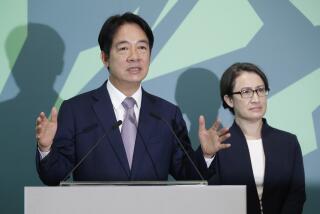Reformer, Planner Named as Vice Premiers in China : Succession: The action makes them both leading candidates to eventually replace Premier Li Peng.
- Share via
BEIJING — In a key step toward gradually creating a government less tainted by the 1989 massacre of pro-democracy protesters in Beijing, China’s national legislature Monday named two influential technocrats as vice premiers.
By moving into these important jobs, Shanghai Mayor Zhu Rongji, 62, and State Planning Commission head Zou Jiahua, 64, become leading candidates to eventually succeed Premier Li Peng.
Zhu, a former engineer, is widely viewed as a leading reformer. He has emerged over the last two years as one of China’s most personable leaders in dealings with the outside world.
Zou, also an engineer, has strong military ties and experience with central planning but no clear record of expressing his own policy views.
“It seems to me that Zhu Rongji comes up here (to Beijing) because he’s probably been the most effective man in China in handling foreigners,” commented a Western diplomat, who spoke on condition he not be further identified. “I think having a man of his visibility and his savoir-faire is very important.”
Zou, who will retain his post as head of the State Planning Commission, is “very bright, very well-informed . . . serious, intense,” with “great mastery of statistics” and a “very logical, well-organized mind,” this diplomat said.
The dual appointments are viewed by many diplomats and other analysts in Beijing as marking a moderate step forward for China’s economic reforms, while doing little to disrupt the uneasy balance between more reformist and more orthodox factions within China’s Communist Party.
“Neither of them is going to rock the boat,” commented another Western diplomat, who also spoke on condition of anonymity. “Both of these people are basically not ideological people. What Zhu Rongji is best known for is he gets things done. And Zou Jiahua (is also) a Mr. Fixit. . . . They need intelligent people to get the job done.”
This diplomat added: “Zhu Rongji has a sweet smell about him. He doesn’t have the reputation of being tainted with the June 4 incident.”
Premier Li’s reputation internationally and among wide segments of the Chinese public was damaged by his highly visible role in advocating the June 4, 1989, army crackdown against student-led pro-democracy demonstrations.
Zhu, by contrast, won praise in Shanghai for his success in using a firm but conciliatory stance to restore order without calling in troops after demonstrations broke out there.
At the time of the crackdown, Zou headed the Machine Building and Electronics Industries Ministry. He was not powerful enough to have influence on decisions about use of force against the demonstrators.
There is widespread speculation among Chinese and foreigners in Beijing that Li, 62, will be required to give up the post of premier when his current term ends in 1993.
Zou and Zhu are now seen as the strongest candidates to replace him.
China also has three other vice premiers, but two of them, Wu Xueqian, 70, and Yao Yilin, 74, are in poor health. Both are expected to step down, but it is not clear when.
Vice Premier Tian Jiyun, 62, also could someday be a candidate for premier. But he was very close to former Communist Party General Secretary Zhao Ziyang, who was ousted from power for opposing the 1989 military crackdown.
Zhu, who speaks English fairly well, has played a highly visible national and international role in promoting plans for development of Shanghai’s Pudong area through liberal economic measures and attraction of foreign investment.
“The future belongs to Zhu Rongji,” a Chinese intellectual with high party contacts commented in an early 1990 conversation. “Remember my words.”
Zhu has won far more of this sort of attention than the Soviet-educated Zou. But some observers say that Zou’s power base in Beijing, including connections with the military, is stronger.
In another promotion Monday, the rubber-stamp National People’s Congress gave Foreign Minister Qian Qichen, 63, the added title of state councilor. State councilors rank above ordinary heads of ministries.
More to Read
Sign up for Essential California
The most important California stories and recommendations in your inbox every morning.
You may occasionally receive promotional content from the Los Angeles Times.













